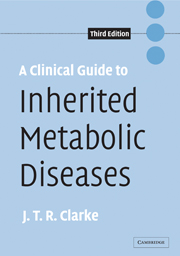Book contents
- Frontmatter
- Contents
- Reviews of first edition
- Reviews of second edition
- List of tables
- List of figures
- Preface
- 1 General principles
- 2 Neurologic syndrome
- 3 Metabolic acidosis
- 4 Hepatic syndrome
- 5 Cardiac syndromes
- 6 Storage syndrome and dysmorphism
- 7 Acute metabolic illness in the newborn
- 8 Newborn screening
- 9 Laboratory investigation
- 10 Treatment
- Index
- References
7 - Acute metabolic illness in the newborn
Published online by Cambridge University Press: 10 September 2009
- Frontmatter
- Contents
- Reviews of first edition
- Reviews of second edition
- List of tables
- List of figures
- Preface
- 1 General principles
- 2 Neurologic syndrome
- 3 Metabolic acidosis
- 4 Hepatic syndrome
- 5 Cardiac syndromes
- 6 Storage syndrome and dysmorphism
- 7 Acute metabolic illness in the newborn
- 8 Newborn screening
- 9 Laboratory investigation
- 10 Treatment
- Index
- References
Summary
There are few situations in clinical medicine as acutely stressful as the precipitate deterioration of a previously healthy newborn infant, coupled with the recognition that, irrespective of the cause, delay in the initiation of appropriate management often leads to death or irreparable brain damage. Severe illness in the newborn, regardless of the underlying cause, tends to manifest itself in a rather stereotypic way with relatively nonspecific findings, such as poor feeding, drowsiness, lethargy, hypotonia, and failure to thrive. Because inherited metabolic diseases are individually rare, clinicians have a tendency to pursue the possibility only after other more common conditions, such as sepsis, have been excluded. Further delay often occurs because the type of investigation required to make the diagnosis of inherited metabolic disease includes unfamiliar tests, which the clinician may feel uncomfortable interpreting owing to a general lack of confidence regarding metabolic problems.
The need for dispatch requires that inborn errors of metabolism be considered along with and at the same time as common acquired conditions, such as sepsis, hypoxic-ischemic encephalopathy, intraventricular hemorrhage, intoxications, congenital viral infections, and certain types of congenital heart disease. Appropriate laboratory investigation, including some simple bedside tests, such as urine tests for reducing substances and ketones, should be initiated without delay, even done at the bedside if possible. Despite the apparent non-specificity of presenting symptoms in neonates, there are some features that increase the likelihood of an inborn error of metabolism.
- Type
- Chapter
- Information
- A Clinical Guide to Inherited Metabolic Diseases , pp. 198 - 227Publisher: Cambridge University PressPrint publication year: 2005



